- Home
- Harlan Coben
Darkest Fear mb-7 Page 22
Darkest Fear mb-7 Read online
Page 22
Stan Gibbs put his hands over his head and ducked into a quasi-emergency-landing position. "Stop!" he yelled, almost childlike. "Dad!"
Another bullet. More glass shards. Myron reached into his pocket and pulled out his gun. Greg grabbed his hand and pulled it down. Myron looked at him.
"Can't kill him," Greg said to Myron. There was blood in his mouth now. "If he dies… Jeremy's only hope."
Myron nodded, but he didn't put the gun away. He looked over at Stan. In the distance, they heard a helicopter. Then sirens. The feds were on their way. No surprise. There was no way they weren't going to follow. By air, at the very least.
Greg's breathing was short spurts. His eyes were going hazy-gray.
"We got to do something here, Stan," Myron said.
"Just stay down," Stan said. Then he opened the car door and shouted, "Dad!"
No reply.
Stan got out of the car. He raised his hands and stood. "Please," he shouted. "They'll be here soon. They'll kill you."
Nothing. The air was so motionless that Myron thought he could still hear the echoes from the gun blasts.
"Dad?"
Myron lifted his head a little and risked a glance. A man stepped out from behind the side of the house. Edwin Gibbs wore full army fatigues with combat boots. He had an ammunition belt hanging off his shoulder. His rifle was pointed toward the ground. Myron could see it was Nathan Mostoni, though he looked twenty years younger. His head was high, chin up. His back was straight.
Greg made a gurgling sound. Myron ripped off his shirt and pushed it against the wound. But Greg's eyes were closing. "Stay with me," Myron urged. "Come on, Greg. Stay here."
Greg did not reply. His eyes fluttered and closed. Myron felt his heart slam into his throat. "Greg?"
He felt for a pulse. It was there. Myron was no doctor, but it didn't feel strong. Oh damn. Oh come on.
Outside the car, Stan moved closer to his father. "Please," Stan said. "Put down the rifle, Dad."
The fed cars poured into the driveway. Brakes squealed. Feds jumped out of their vehicles, took position using the open doors as shields, aimed their weapons. Edwin Gibbs looked confused, panicked, Frankenstein's monster suddenly surrounded by angry villagers. Stan hurried toward him.
The air seemed to thicken, molasses-like. It was hard to move, hard to breathe. Myron could almost feel the officers tense up, fingers itchy, tips touching the cold metal of the trigger. He let go of Greg for a moment and shouted, "You can't shoot him!"
A fed had a megaphone. "Put down the rifle! Now!"
"Don't shoot!" Myron shouted.
For a moment nothing happened. Time did that in-and-out motion where everything rushes and freezes all at one time. Another fed car skidded up the driveway. A news van followed, screeching when it hit the brakes. Stan kept walking toward his father.
"You are surrounded," the megaphone said. "Drop the rifle and put your hands behind your head. Drop to your knees."
Edwin Gibbs looked left, looked right. Then he smiled. Myron felt the dread rise up in his chest. Gibbs lifted his rifle.
Myron rolled out of the car. "No!"
Stan Gibbs broke into a sprint. His father spotted him, his face calm. He aimed the rifle at his approaching son. Stan kept running. Time did stop this time, waiting for the blast of gunfire. But it didn't come. Stan had gained on him too fast. Edwin Gibbs closed his eyes and let his son tackle him. The two men fell to the ground. Stan stayed on top of his father, blanketing him, leaving no space open.
"Don't shoot him," Stan yelled. His voice sounded hurt, again so childlike. "Please don't shoot him."
Edwin Gibbs lay on his back. He let go of the rifle. It dropped into the grass. Stan pushed it away, still on top of his father, still shielding him from harm. They stayed there until the officers took over. They gently removed Stan and then rolled Edwin Gibbs onto his stomach, cuffing his hands behind his back. The news camera caught it all.
Myron turned back to the car. Greg's eyes were still closed. He wasn't moving. Two of the officers ran toward the car, calling into their radios for an ambulance. Nothing Myron could do for Greg now. He looked back at the farmhouse, his heart still lodged in his throat. He ran toward the house and grabbed the knob. The door was locked. He used his shoulder. The door came down. Myron stepped into the foyer.
"Jeremy?" he called out.
But there was no reply.
Chapter 36
They didn't find Jeremy Downing. Myron checked every room, every closet, the basement, the garage. Nothing. The feds streamed in with him. They started knocking down walls. They used a heat sensor to check for underground caves or hidden places. Nothing. In the garage, they found a white van. In the back of it, they found one of Jeremy's red sneakers.
But that was it.
News vans, lots of them, gathered at the end of the driveway. What with the kidnapped boy, his famous father shot and in critical condition, a potential serial killer in custody, the connection to Stan Gibbs and the famed plagiarism charges — the story was getting the full, round-the-clock, give-it-a-banner-and-theme-music, death-of-Diana coverage. Stiffly coiffed correspondents flashed their best grim-news teeth and led with phrases like "the vigil continues" or "the search is reaching its x th hour" or "behind me lurks the lair" or "we'll be here until."
A recent photograph of Jeremy, the one Emily had on the Web, ran continuously on all the stations. Brokaw, Jennings and Rather interrupted their programming. Viewers called in tips, but so far none amounted to anything.
And the hours passed.
Emily drove to the scene. It played on all the usual outlets, her head lowered, hurrying toward a waiting car like an arrested felon, the flashbulbs creating a grotesque strobe effect. Cameramen elbowed each other out of the way to capture a glimpse of the stricken mother collapsing in the back of the car. They even got a shot of her through the passenger seat crying. Great TV.
Nightfall brought out searchlights. Volunteers and law officials scoured the nearby grounds for signs of recent graves or digging. Nothing. They brought in dogs. Nothing. They spoke to neighbors, some of whom "never trusted that family" but most gave the standard "seemed like nice folk, real quiet neighbors" spiel.
Edwin Gibbs had been taken into custody. They tried to question him at the Bernardsville Police Station, but he wasn't talking. Clara Steinberg became his attorney. She stayed with him. So did Stan. They pleaded with Edwin, Myron guessed, but so far, he hadn't talked.
Back at the farmhouse, the wind picked up. Myron's bad knee ached, each step giving him a fresh jolt of pain. The pain was unpredictable, arriving whenever it damn well pleased, staying on like the most unwelcome houseguest. There was no side benefit to the knee pain, no weather forecasting or anything like that. Some days it just ached. Nothing he could do about it. He approached Emily and put his arm around her.
"He's still out there," Emily said to the dark.
Myron said nothing.
"He's all alone. And it's night. And he's probably scared."
"We'll find him, Em."
"Myron?"
"Hmm."
"Is this more payback for that night?"
Another search party returned, their shoulders slumped in resignation, if not defeat. Odd thing, these search parties. You wanted to find something, yet you didn't want to find something.
"No," Myron said. "I think you were right. I think our mistake was the best thing that could have happened. And maybe there's a price to pay to have something so good."
She closed her eyes, but she did not cry. Myron stayed next to her. The wind howled, scattering the surrounding voices like dead leaves, whipping branches, and whispering in your ear like the most frightening lover.
Chapter 37
Myron and Win looked through the oneway glass at Clara Steinberg's back and the faces of Stan and Edwin Gibbs. Kimberly Green stood with them. So did Eric Ford. Emily had gone to the hospital to sit vigil while Greg was in surgery. No one seemed to know if he'd
make it.
"Why aren't you listening in?" Myron asked.
"Can't," Ford replied. "Attorney-client."
"How long they been at it?"
"On and off since we took him into custody."
Myron checked the clock behind his head. Nearly three in the morning. Evidence collection teams had leveled the house, but still no clue where Jeremy was. Fatigue lined everyone's face, except maybe Win's. Fatigue never registered on his face. Win must internalize it. Or maybe it had something to do with having little to no conscience.
"We don't have time for this," Myron said.
"I know," Eric Ford said. "It's been a long night for all of us."
"Do something."
"Like what?" Ford snapped. "What exactly would you like me to do?"
Win picked up that one. "Perhaps you could speak to Ms. Steinberg in private."
That hooked Ford's attention. "What?"
"Take her into another room," Win said, "and leave me alone with your suspect."
Eric Ford looked at him. "You shouldn't even be here. He" — a gesture toward Myron—"represents the Downing family, as much as I don't like it. But you got no reason to be here."
"Make a reason," Win said.
Eric Ford waved his hand as if this wasn't worth his time.
Win kept the voice at a low, soothing level. "You don't have to be a part of it," he said. "Simply talk to his attorney. Leave Gibbs alone in the room. That's all. Nothing unethical about that."
Ford shook his head. "You're crazy."
"We need answers," Win said.
"And you want to beat them out of him."
"Beating leaves marks," Win said. "I never leave marks."
"That's not how it works, pal. Ever heard of the U.S. Constitution?"
"It's a document," Win said, "not a trump card. You have a choice. The obscure rights of that subhuman" — Win gestured through the glass—"or a young boy's right to live."
Ford leaned his forehead against the glass.
"If the boy dies while we're standing here," Win said, "how will you feel then?"
Ford shut his eyes. In the holding room, Clara Steinberg rose from her chair. She turned, and for the first time, Myron saw her face. He knew that she had represented bad people before — very, very bad people — but whatever horrors she was now hearing had washed away her skin tone and etched in something that would probably never leave. She approached the one-way mirror and knocked. Ford hit the sound switch.
"We need to talk," she said. "Let me out."
Eric Ford met Clara and Stan by the door. "Let's head down this way," he said.
"No," Clara said.
"Pardon me?"
"We'll talk in here," she said, "where I can watch my client. Wouldn't want an accident, now, would we?"
There were no chairs so they all stood by the oneway window — Kimberly Green, Eric Ford, Clara Steinberg, Stan Gibbs, Myron and Win. Stan kept his head down and plucked at his lower lip with his fingers. Myron tried to meet his eyes. Stan never gave him the chance.
"Okay," Clara said. "First off, we need a D.A."
"What for?" Eric Ford asked.
"Because we want a deal."
Ford tried to snicker. "Are you out of your mind?"
"No. My client is the only one who can tell you where Jeremy Downing is. He'll only do so under specific conditions."
"What conditions?"
"That's why we need a D.A."
"A D.A. will back whatever I agree to," Eric Ford said.
"I'll still want it in writing."
"And I want to hear what you're looking for here."
"Okay," Clara said, "here's the deal. We help you find Jeremy Downing. In exchange, you guarantee not to seek the death penalty for Edwin Gibbs. You also agree to psychiatric tests. You then recommend he be placed in a proper mental health facility, not a prison."
"You have to be kidding me."
"There's more," Clara said.
"More?"
"Mr. Edwin Gibbs will also agree to donate bone marrow to Jeremy Downing if the need arises. I understand that Mr. Bolitar is representing the family here. For the record, we should note that he is present as a witness to this agreement."
No one said anything.
"So we clear?" Clara said.
"No," Ford said, "we're not."
Clara adjusted her eyeglasses. "This deal is nonnego-tiable." She turned to leave, her gaze snagging on Myron's. Myron just shook his head.
"I'm his attorney," she said to him.
"And you'll let a boy die for him?" Myron said.
"Don't start," Clara said, but her voice was soft.
Myron studied her face again, saw no give. He turned to Ford. "Agree," he said.
"Are you nuts?"
"The family cares about retribution. But they care more about finding their son. Agree to her terms."
"You think I'm taking orders from you?"
Myron's voice was soft. "Come on, Eric."
Ford frowned. He rubbed his face with his hands and then dropped them back to his side. "This agreement assumes, of course, that the boy is still alive."
"No," Clara Steinberg said.
"What?"
"Alive or dead does not change the state of Edwin Gibb's mental health."
"So you don't know if he's alive or—"
"If we did, it would be an attorney-client communication and thus confidential."
Myron looked at her in stark horror. She met his eyes and would not blink. Myron tried Stan, but his head was still lowered. Even Win's face, usually the model of neutrality, was on edge. Win wanted to hurt somebody. He wanted to hurt somebody badly.
"We can't agree to that," Ford said.
"Then there's no deal," Clara said.
"You have to be reasonable—"
"Do we have a deal or not?"
Eric Ford shook his head. "No."
"See you in court, then."
Myron moved into her path.
"Step aside, Myron," Clara said.
He just looked down at her. She raised her eyes.
"You think your mother wouldn't be doing the same thing?" Clara said.
"Leave my mother out of this."
"Step aside," she said again. Aunt Clara was sixty-six. For the first time since he'd known her, she looked older than her age.
Myron turned back to Eric Ford. "Agree," he said.
He shook his head. "The boy is probably dead."
"Probably," Myron repeated. "Not definitely."
Win spoke up this time. "Agree," he said.
Ford looked at him.
"He won't get off easily," Win said.
Stan's head finally rose at that one. "What the hell is that supposed to mean?"
Win gave him flat eyes. "Absolutely nothing."
"I want this man kept away from my father."
Win smiled at him.
"You don't get it, do you?" Stan said. "None of you get it. My father is sick. He's not responsible. We're not making this up. Any competent psychiatrist in the world will agree. He needs help."
"He should die," Win said.
"He's a sick man."
"Sick men die all the time," Win said.
"That's not what I mean. He's like someone who has a heart condition. Or cancer. He needs help."
"He kidnaps and probably kills people," Win said.
"And it doesn't matter why he does it?"
"Of course it doesn't matter," Win said. "He does it. That's enough. He should not be put in a comfortable mental hospital. He should not be allowed to enjoy a wonderful film or read a great book or laugh again. He should not be able to see a beautiful woman or listen to Beethoven or know kindness or love — because his victims never will. What part of that don't you understand, Mr. Gibbs?"
Stan was shaking. "You agree," he said to Ford. "Or we don't help."
"If the boy dies because of this negotiation," Win said to Stan, "you will die."
Clara stepped into Win's face. "You th
reatening my client?" she shouted.
Win smiled at her. "I never threaten."
"There are witnesses."
"Worried about collecting your fee, Counselor?" Win asked.
"That's enough." It was Eric Ford. He looked at Myron. Myron nodded. "Okay," Ford said slowly. "We agree. Now, where is he?"
"I'll have to take you," Stan said.
"Again?"
"I wouldn't be able to give you directions. I'm not even sure I can find it after all these years."
"But we come along," Kimberly Green said.
"Yes."
There was an empty space, a sudden stillness that Myron didn't like.
"Is Jeremy alive or dead?" Myron asked.
"Truth?" Stan said. "I don't know."
Chapter 38
Eric Ford drove with Kimberly Green riding shotgun and Myron and Stan in the backseat. Several cars' worth of agents followed them. So too did the press. Nothing they could do about that.
"My mother died in 1977," Stan said. "Cancer. My father was already unwell. The one thing in his life that mattered to him — the one good thing — was my mother. He loved her very much."
The time on the car clock read nearly 4:03 A.M. Stan told them where to turn off Route 15. A sign read DINGSMAN BRIDGE. They were heading into Pennsylvania.
"Whatever sanity was still there, my mother's death stripped away. He watched her suffer. Doctors tried everything — used all their technological advances — but it only made her suffer more. That's when my father started with the strength of the mind. If only my mother hadn't relied on technology, he thought. If only she used her mind instead. If only she'd seen its limitless potential. Technology killed her, he said. It gave her false hope. It stopped her from using the one thing that could save her — the limitless human brain."
No one had a comment.
"We had a summerhouse out here. It was beautiful. Fifteen acres of land, walking distance to a lake. My father used to take me hunting and fishing. But I haven't been out here in years. Haven't even thought about the place. He took my mother out here to die. Then he buried her in the woods. See, it's where her suffering finally ended."
The obvious question hung in the air, unasked: And who else's?

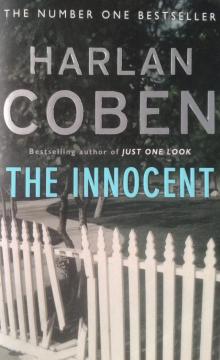 The Innocent
The Innocent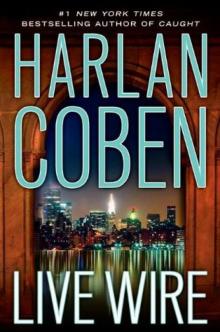 Live Wire
Live Wire Play Dead
Play Dead Drop Shot
Drop Shot Seconds Away
Seconds Away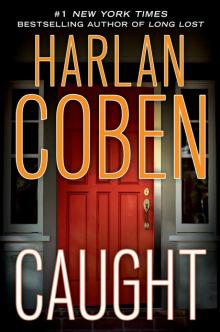 Caught
Caught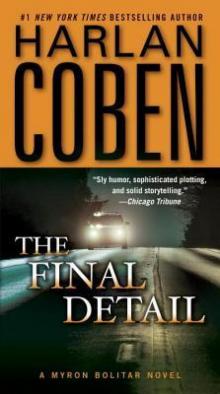 The Final Detail
The Final Detail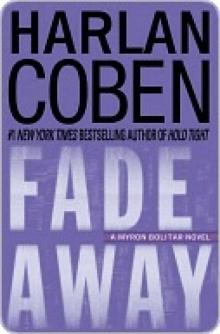 Fade Away
Fade Away Home
Home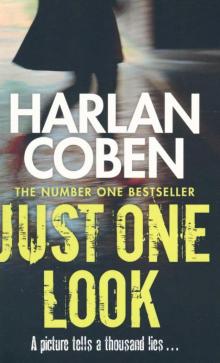 Just One Look
Just One Look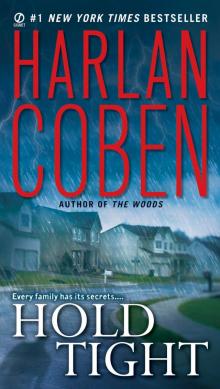 Hold Tight
Hold Tight Fool Me Once
Fool Me Once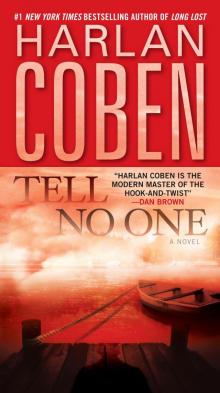 Tell No One
Tell No One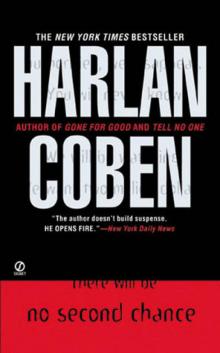 No Second Chance
No Second Chance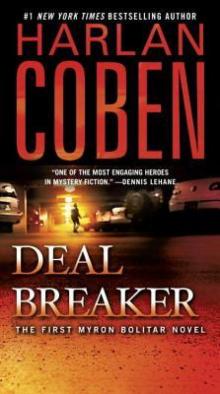 Deal Breaker
Deal Breaker Long Lost
Long Lost One False Move
One False Move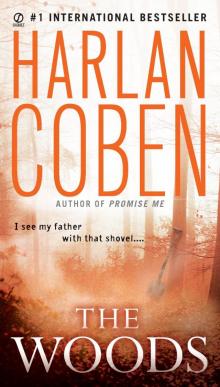 The Woods
The Woods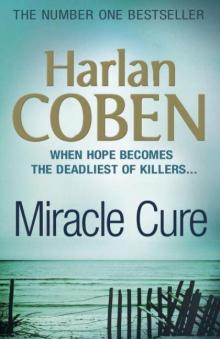 Miracle Cure
Miracle Cure Found
Found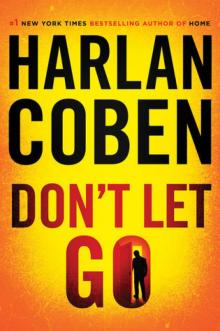 Don't Let Go
Don't Let Go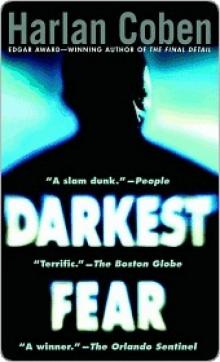 Darkest Fear
Darkest Fear The Stranger
The Stranger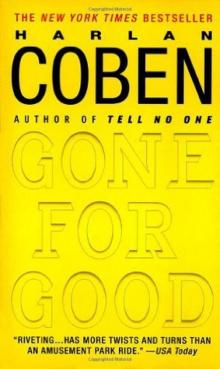 Gone for Good
Gone for Good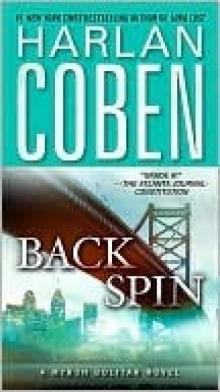 Back Spin
Back Spin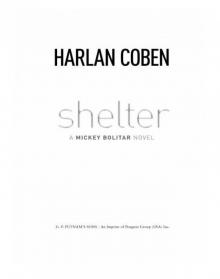 Shelter
Shelter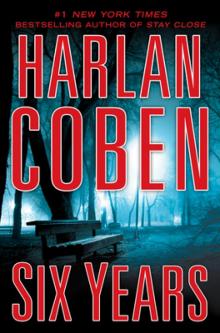 Six Years
Six Years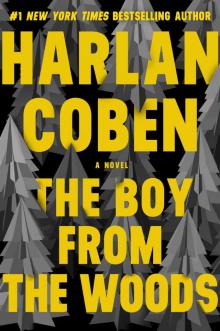 The Boy from the Woods
The Boy from the Woods Missing You
Missing You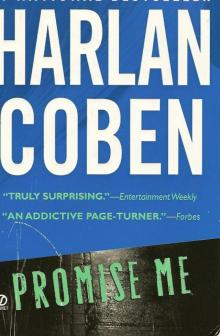 Promise Me mb-8
Promise Me mb-8 The Final Detail: A Myron Bolitar Novel
The Final Detail: A Myron Bolitar Novel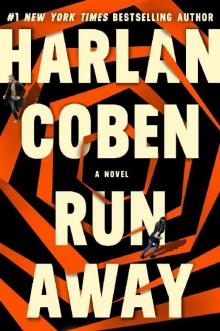 Run Away
Run Away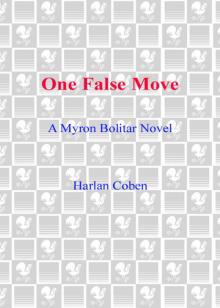 One False Move: A Myron Bolitar Novel
One False Move: A Myron Bolitar Novel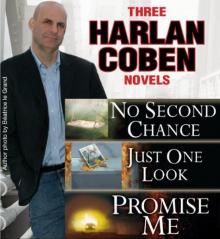 Three Harlan Coben Novels
Three Harlan Coben Novels the Woods (2007)
the Woods (2007) Tell No One (2001)
Tell No One (2001) the Innocent (2005)
the Innocent (2005)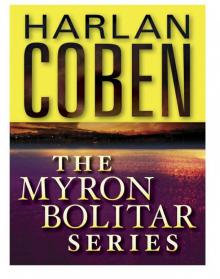 The Myron Bolitar Series 7-Book Bundle
The Myron Bolitar Series 7-Book Bundle Gone for Good (2002)
Gone for Good (2002) Caught (2010)
Caught (2010) Hold Tight (2008)
Hold Tight (2008)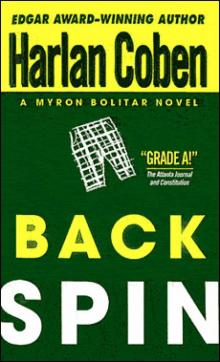 04 - Back Spin
04 - Back Spin Miracle Cure (1991)
Miracle Cure (1991) Harlan Coben 3 Novel Collection
Harlan Coben 3 Novel Collection Just One Look (2004)
Just One Look (2004)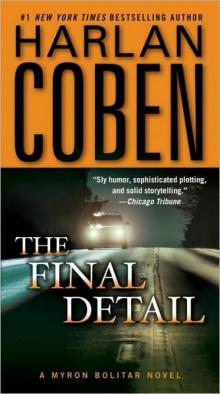 The Final Detail mb-6
The Final Detail mb-6 Play Dead (2010)
Play Dead (2010)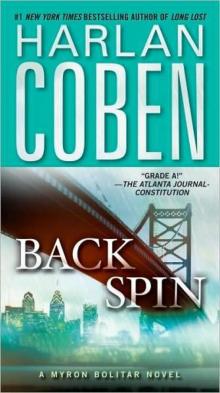 Back Spin mb-4
Back Spin mb-4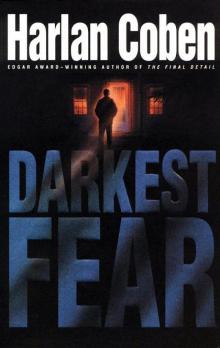 Darkest Fear mb-7
Darkest Fear mb-7